Worried that your gorgeous cactus is turning brown? Is it dying? Actually, it’s called Cactus Corking! Here’s everything about it!
Yes, cactus corking is normal! It’s like your cactus growing tough outer skin as it ages or faces stress. It might not be pretty, but it’s usually harmless. Here’s why it happens and how to take care of it!
What is Cactus Corking?
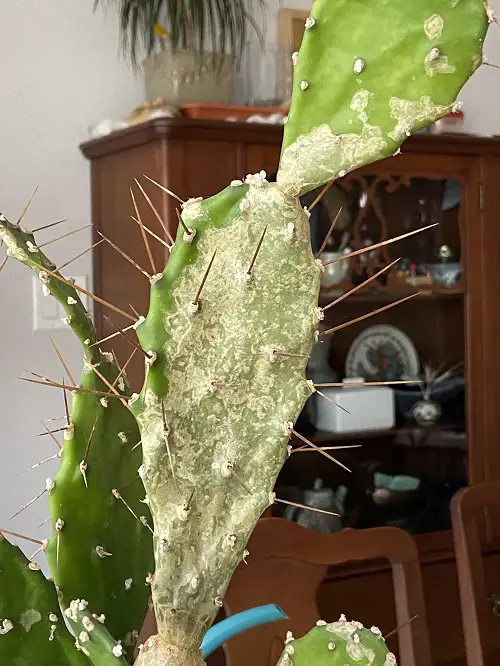
The textbook definition of Cactus Corking would be the gradual change in coloration and texture of a cactus plant due to several external factors as well as aging.
In simple terms, Cactus corking is when the smooth, green skin of your cactus slowly turns into a rougher, tannish layer that feels like cork. This isn’t your cactus getting sick, though.
It’s actually its way of protecting itself! Just like we put on sunscreen at the beach, the corky layer helps shield your cactus from strong sunlight, cold weather, or even the occasional bump and slight damage. It’s like a tough suit of armor!
Corking can happen naturally as your cactus gets older, but it can also speed up if it feels a little stressed. Maybe it’s not getting quite enough water, or perhaps it’s sitting in a spot that’s too hot or too cold. Even too much fertilizer or mineral deposit in the soil can make your cactus feel stressed and start corking faster.
In the case of aging and severe problems, it is irreversible, but it can be reversed if it is caused by one or/the many reasons mentioned below.
Cactus Corking: Reasons and Solutions
1. You are Watering it Wrong
Irregular watering schedules can accelerate the corking process in your cactus. If the amount of water provided is too little, the plant starts to wither and hence loses its trademark colors.
On the other hand, excess watering can also cause stress to your cactus and force it to cork. It usually causes the tips of the cactus and some succulents (especially an aloe vera) to turn brown or yellow.
Solution
Maintain a regular watering schedule that provides only the right amount of water regularly but only when it is necessary (remember the top soil dry rule) for a healthy cactus plant.
Since they are desert plants, they can tolerate drought, but it is not the case of survival. We want them to thrive and look their best. Depending on the cactus variety, season, and soil type, tweak the amount of water you provide.
- Overwatered cactus: Observe the soil, as it clearly indicates whether you should irrigate or let your cactus be as it is. If the soil is still wet, do not water it! Here’s how to save an overwatered plant.
- Underwatered Cactus: If the soil is extremely dry and the soil is beginning to crack, it is high time to water your plant thoroughly.
2. It Gets Too Much Sun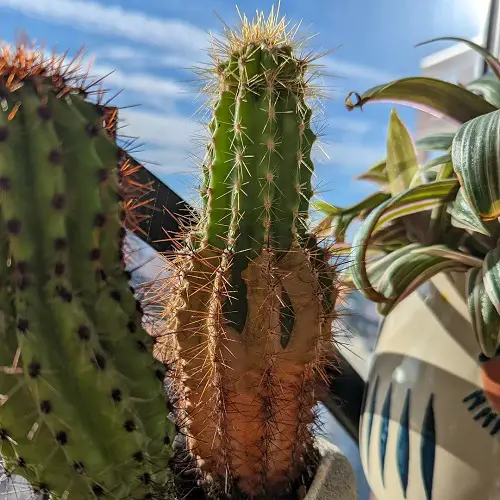
Overexposure to bright and strong sunlight for an extended period of time can cause corking, too. Sudden location changes can also cause stress and lead to the same.
Solution
Try shifting the cactus plant to a spot where it does not receive afternoon sun or lesser light than the previous location. If you’ve moved it from a shady spot to a sunny spot, let it acclimate and gradually expose it to full sun.
3. The Environment is Too Cool or Dry
Naturally, cacti have evolved over millions of years to withstand heat rather than cold. So, if you have an indoor cactus plant that remains in an air-conditioned room or if the climate you live in is on the cooler side, corking may be an issue for sure.
Solution
It is obvious that when one feels cold, all they require is a bit of warmth. If you begin to notice corking due to coldness, then relocate the plant to a warmer area of the house—in a room that has a stable temperature, like an upstairs or south-facing room or probably near a fireplace.
4. Pests and Diseases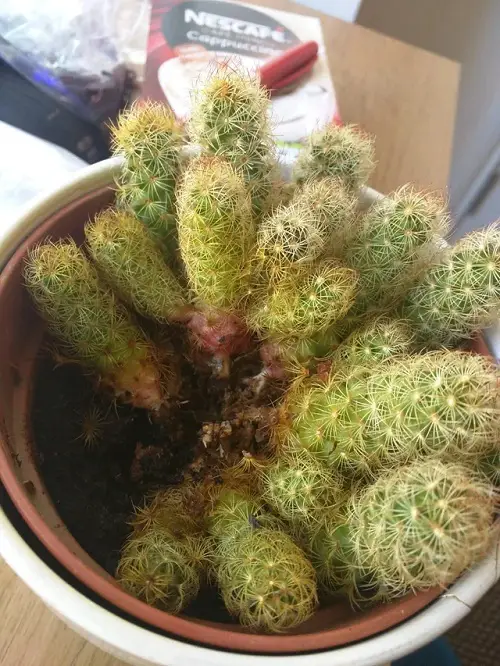
Fungal infections can damage your cactus and cause discoloration. Along with that, many pests, such as aphids, would love to infest your thorny specimen, and they too can cause browning or puncturing of the stems.
Solution
Prevention is better than cure, they say, which is true in this case. Hence, monitoring your cactus regularly for infestations and diseases can snip the problem in the bud. You can also use pesticides or preventive measures to provide an extra layer of security (Choose the pesticides very carefully, as you will find out in the next reason).
If you later discover that your plant has been infected or infested, you can still try using pesticides and other anti-fungal solutions to cure it. Cutting off the infected or infested area is the last rescue option to save it.
5. You’re Drenching it with Pesticides
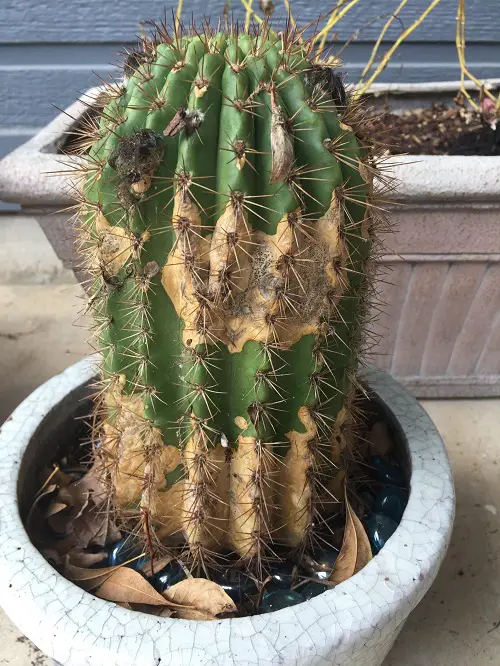
The best way to observe this is to look for damage or corking across large parts of the cactus, especially where you applied a pesticide. This can be due to overuse or incorrect application.
Solution
Try using mild pesticides like soap water or neem oil spray to get rid of the pest problem. If you choose commercial pesticides, dilute them to a level that won’t burn your desert plant. Also, try a small application first before applying on a full scale.
6. There’s a Salt or Mineral Build-up
Inappropriate amounts of minerals and salt in the soil can lead to an imbalance in nutrient absorption and, hence, a change in color and texture. Salt buildup can be due to many factors, such as the use of hard or mineral-rich water and frequent application of fertilizers and pesticides. So what to do?
Solution
Using RO water, rainwater, or cooled boiled water can be an effective method to fight this cause of corking. If the problem persists, you should completely change the soil with a fresh batch.
7. It’s Due to External Damage
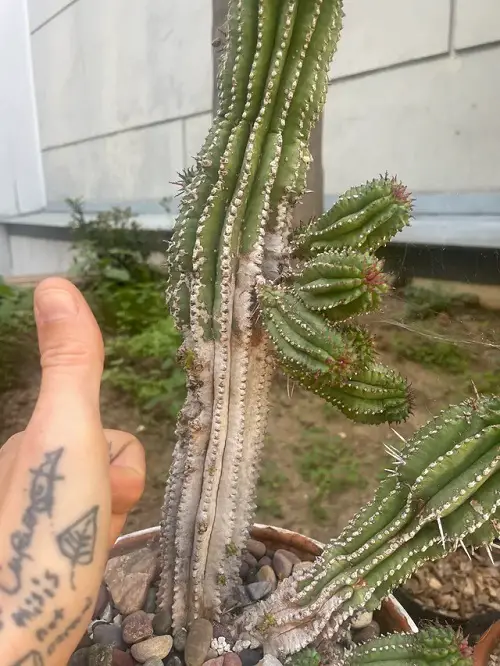
Although this reason might seem silly, it is true and can lead to cactus corking. Exposure to fire, accidental branding, and the usage of unsterilized gardening tools can cause extreme stress to your plant and, therefore, lead to corking.
Solution
Being a responsible plant parent is necessary for their optimal growth. Make sure that your cactus is placed in a surrounding where it is not touched, dislodged, exposed to fire, played by toddlers and pets, or anything accidental (which includes contact with cold window panes). A designated and plant-friendly area is necessary for best results.


